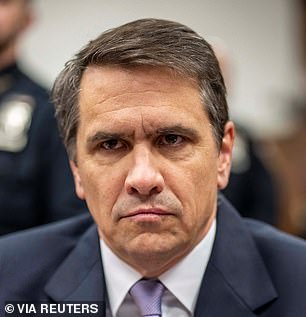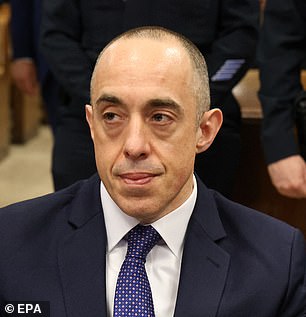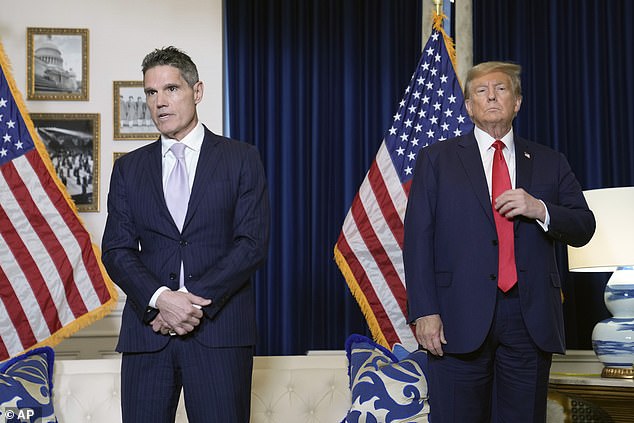Donald Trump’s lawyers argued in court Thursday that a ruling that Trump’s communications with former Vice President Mike Pence around January 6 should be deemed immune would “destroy” the new indictment against him.
A federal judge has been told that conversations between Trump and Pence over the vice president’s role could unravel the government’s entire case against the former president, with the November election once again looming over timing decisions in the blockbuster case.
“If in fact the communications with Vice President Pence, which are in this entire indictment … if in fact they are immune, then that entire indictment is improper,” Trump lawyer John Lauro told Judge Tanya Chutkan at a hearing Thursday.
“If Your Honor decides that that is immune, then the entire prosecution collapses,” he said.
In a case that once sought to put Trump on trial by Jan. 6 even in the midst of his campaign for the White House, Trump’s team wants the chance to go first and issue a briefing to dismiss the new allegation against him.
Last week, special prosecutor Jack Smith obtained a new grand jury indictment following a Supreme Court ruling on the immunity issue that threw a wrench into the case.
Prosecutors want to keep things moving — to file their own brief in about three weeks and have a chance to share more evidence they have obtained. Just as they did when the case first arose a year ago, government prosecutors want a timeline that will allow the case to continue moving forward.
Trump lawyer John Lauro (left) said communications between Trump and Mike Pence will ultimately fall under presidential immunity.
Judge Chutkan became angry when Lauro mentioned the information being entered into the public record.‘at a very sensitive moment in the history of our nation.
She took that as Lauro invoking the election and asking her to delay the proceedings because of that, and she returned to her previous statements about not being guided by the political calendar.
“I understand that there are pending elections. I have said before and I say again that the electoral process and the timing of the elections… are not relevant here,” he warned.
She said setting a trial date now would be an “exercise in futility” – effectively ending the prospect of a trial before Americans go to the polls.
Lauro says Mike Pence’s communications — in which Trump told his vice president he had the authority not to accept votes for Joe Biden certified by the states — constitute a “gateway issue.” He wants Chutkan to make a decision on that before looking at other evidence prosecutors have gathered.
“If this issue is decided, that entire briefing will never take place,” he said.
Prosecutor Thomas Windom argued for the judge to choose “the most efficient and practical way to proceed,” while arguing that even if the Pence material were to fade away, that would not blow up the case. “It’s not an automatic dismissal of the indictment,” he said.
Chutkan also decided to allow Lauro to file a motion arguing that Smiths’ appointment was unconstitutional.


Trump’s lawyers, Todd Blanche and Emil Bove, attended the court but did not speak.
But he expressed skepticism, noting that it was based on a concurring opinion by Supreme Court Justice Clarence Thomas and a ruling by “another judge” in Florida on the same issue in the classified documents case.
She asked why that would justify “going against binding D.C. Circuit precedent” and said she did not find the argument particularly “persuasive.”
Chutkan had been presiding over the Jan. 6 case and was keeping it on a fast track until Trump’s team upended the schedule by going to the Supreme Court with its claims of presidential immunity from prosecution.
The high court’s July opinion left it to lower courts to weigh which actions fall within “official” acts that enjoy absolute immunity protections.
At one point, the judge said the timeline proposed by Trump’s team could drag the case into next year, noting that it’s already a year into her docket. She showed interest in addressing several challenges that Trump’s lawyers want to file simultaneously.
“We can all walk and chew gum at the same time,” Chutkan said.
Smith reworded an indictment that removed a key part of the narrative: Trump’s alleged use of top Justice Department officials to interfere with the state’s vote count. But he maintained the four main charges that Trump interfered in the 2020 election in an attempt to stay in office.
Lawyers have yet to argue whether the new version complies with the Supreme Court’s directive.
Defense attorneys are preparing even more motions to dismiss the case entirely, including that Trump is subject to “selective vindictive prosecution.”
Among the challenges Trump’s team has signaled it would file is one arguing that Smith’s appointment is unconstitutional. That argument was accepted by Trump-appointed Judge Aileen Cannon, who is overseeing the classified documents case in Florida. Cannon dismissed the case, though Smith’s team is appealing and an outside watchdog group is seeking to remove her from the case.
Trump, who did not appear in court, is charged with conspiracy to defraud the United States, conspiracy to obstruct an official proceeding when Congress was meeting to count electoral votes for president and conspiracy against the right of the people to have their votes counted.
His lawyer pleaded not guilty in court.
The new indictment says that “despite having lost, the defendant, who was also the sitting president, was determined to remain in power.”
She called the conduct personal, saying he “sought to recruit the Vice President to assist him in the scheme to use his role as President of the Senate to fraudulently alter the election results. The defendant had no official responsibilities related to the certification procedure, but did have a personal interest as a candidate in being named the winner of the election.”


